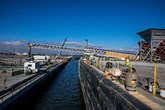Dry Bulk Bottlenecks And Beyond
Published by Alfie Lloyd-Perks,
Assistant Editor
Dry Bulk,
Ben Beattie, Forbeats, provides an overview of the European dry bulk sector, examines the causes of disruption, and explores how toll processors can help operators overcome challenges.
The dry bulk sector underpins Europe’s industrial base, powering its energy mix, agricultural supply, and chemical industries. Commodities such as coal, iron ore, grains, fertilizers, and specialty chemicals flow in vast volumes through ports like Rotterdam, Antwerp, and Hamburg, as well as through key Mediterranean hubs. Europe is not only a vital consumption market but also a major global transit corridor for dry bulk shipping.
In recent years, the sector has faced unprecedented turbulence. The Russia-Ukraine war has disrupted Black Sea grain exports and constrained supplies of essential raw materials. Attacks on vessels in the Red Sea have forced cargo to avoid the Suez Canal and reroute around Africa, lengthening transit times and inflating freight costs. Meanwhile, Brexit has added bureaucracy and customs delays for UK-EU trade, while shifting tariff landscapes continue to complicate flows between major economies. Layered on top of this are tightening environmental regulations that require costly investments in vessels and port infrastructure. As a result of these challenges, bottlenecks have become an inevitable part of doing business.
Market overview
The dry bulk market is vast, representing roughly half of global seaborne trade by volume. In Europe, demand is driven by a diverse mix of commodities: grain imports to feed populations, iron ore and coal for steelmaking, fertilisers for agriculture, and an increasingly important flow of specialty and commodity chemicals. Despite long-term demand, the market is cyclical and subject to significant volatility.
In fact, the sector faces several structural challenges. Market volatility and fluctuating freight rates often dictate investment decisions, leaving operators vulnerable to sudden downturns. Overcapacity in the global dry bulk fleet has at times depressed freight rates, eroding profitability and leading to underutilised vessels.
Environmental regulations are another major challenge: the International Maritime Organisation (IMO) has introduced carbon intensity targets, while the EU’s Emissions Trading Scheme (ETS) has been covering CO2 emissions from all large ships (of 5000 t and above) entering EU ports, regardless of the flag they fly, since January 2024. Compliance requires investments in vessel retrofits, alternative fuels, or carbon allowances – an additional cost burden in an already tight-margin industry.
Geopolitical influences
Geopolitical events have had a major impact on European dry bulk trade. The war in Ukraine has reduced exports of grain and fertilizers from the Black Sea, pushing importers to diversify sourcing from other regions, while sanctions on Russia have reshaped flows of coal and oil products into Europe. At the same time, Red Sea disruptions are forcing vessels to take the Cape of Good Hope route, adding weeks to voyages and substantially increasing shipping costs.
Trade policy uncertainty is also weighing on flows. According to BIMCO data, 1.5% of global dry bulk cargoes – equivalent to 2.6% of demand – were already impacted by tariffs imposed by the US and retaliatory tariffs by China in Q1 of 2025. Europe, as a key node in global supply chains, is exposed to these shifting patterns.
In response to these pressures, operators require greater resilience. To achieve this, companies are diversifying sourcing and routes, holding larger inventories, and in some cases nearshoring production. Supply chain visibility, flexibility, and predictability have become paramount.
Yet these strategies often introduce new complexities, requiring greater coordination and adaptability across the sector. For many, bottlenecks – whether at ports, in transport, or within manufacturing – are unavoidable without external support.
Enjoyed what you've read so far? Read the full article and the rest of the Autumn issue of Dry Bulk by registering today for free!Read the article online at: https://www.drybulkmagazine.com/special-reports/08102025/dry-bulk-bottlenecks-and-beyond/
You might also like
Terminal Transfer Triumph
Travis Thooft, Superior Industries, explains how flexible transfer conveyors support efficient and reliable operations in dynamic marine terminal environments.

